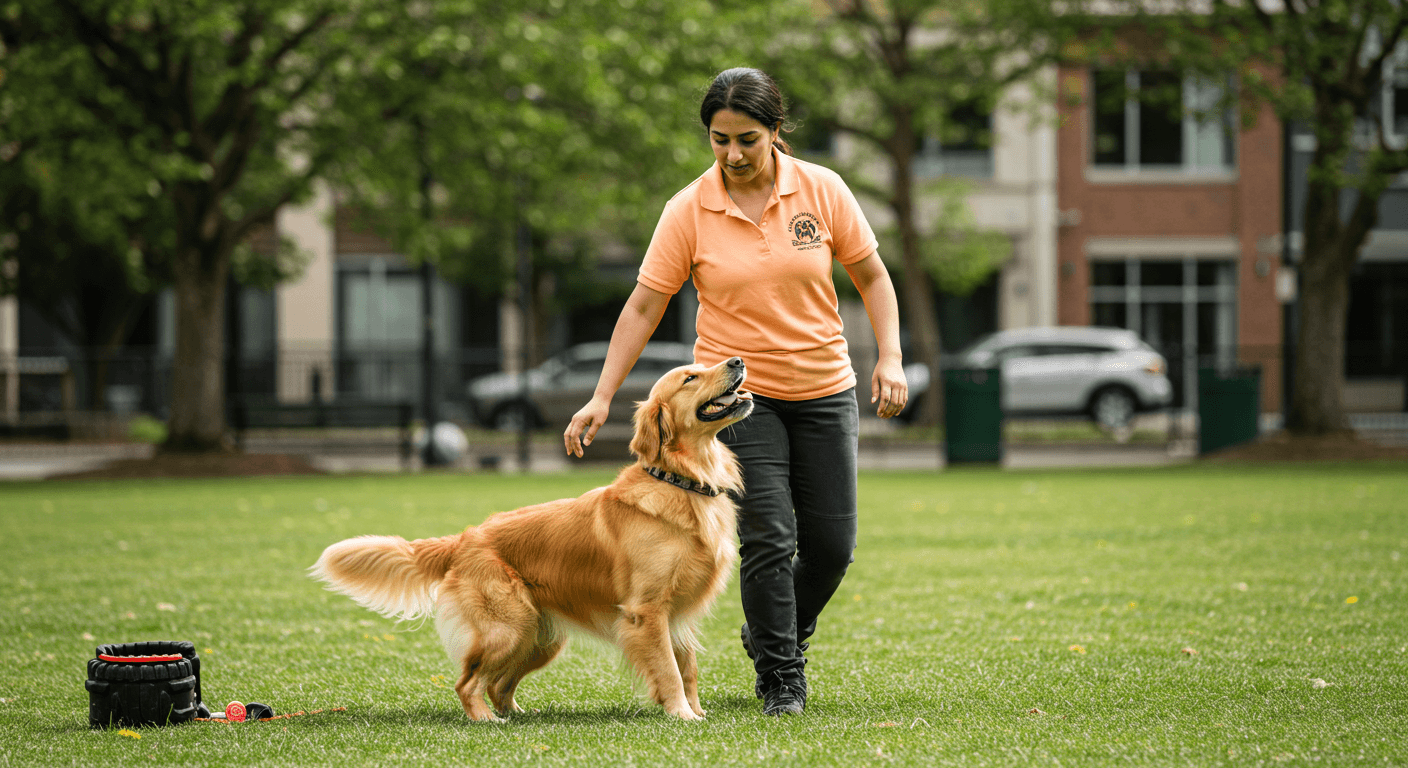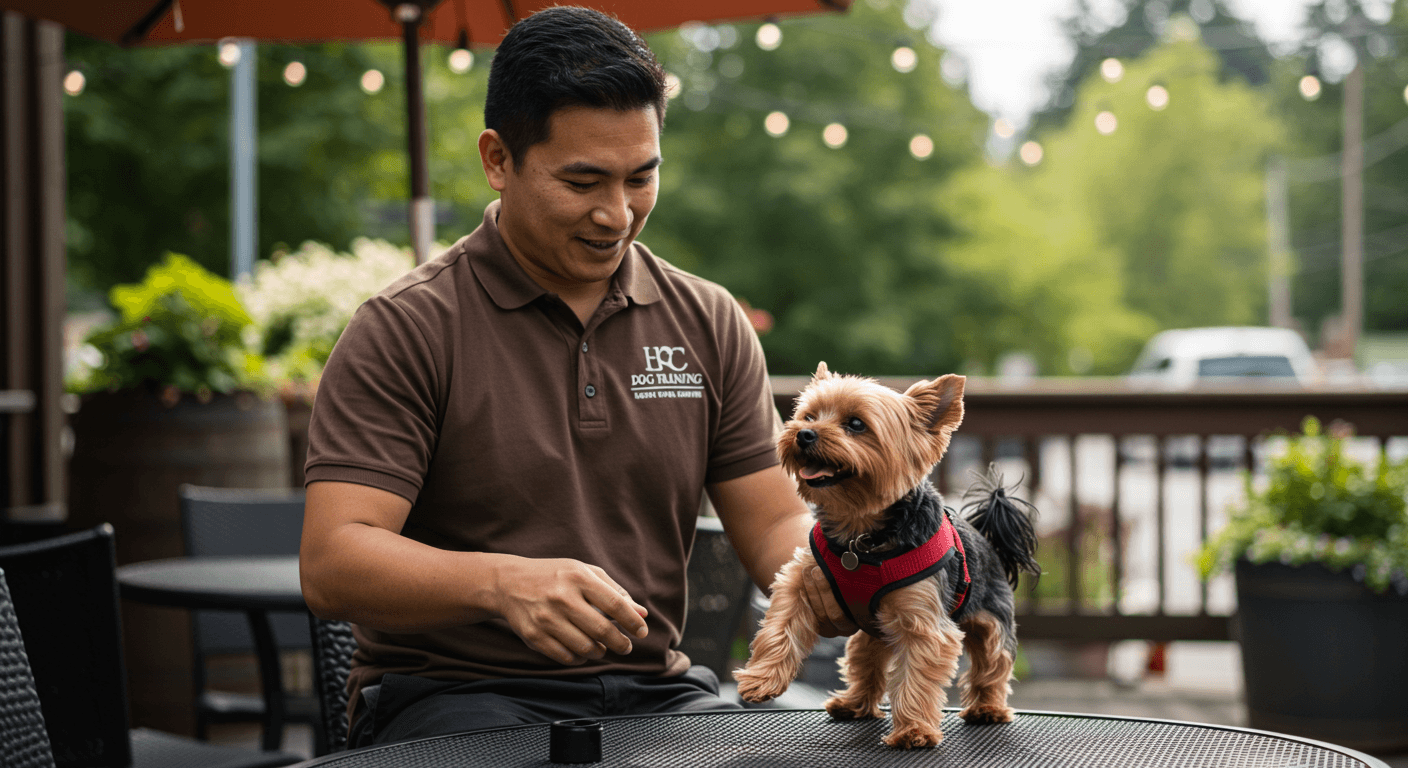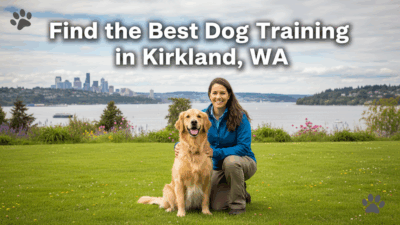Your Complete Guide to Choosing a Dog Trainer in Kirkland and Surrounding Areas
Living with a dog in Kirkland means navigating life in one of King County’s most vibrant lakeside communities. Your dog needs to handle busy waterfront trails at Marina Park, crowded farmers markets downtown, and weekend crowds at local shops without pulling or jumping on strangers.
Finding the right professional dog trainer in Kirkland starts with understanding your local environment. Dogs here encounter everything from paddle boarders launching at Houghton Beach to joggers on the Cross Kirkland Corridor trail. A trainer who knows these specific challenges can help you build real-world skills that work both at home and out in your neighborhood.
Because Kirkland sits in King County, you’ll follow both city and county regulations for pet ownership. Working with someone familiar with these local rules makes training sessions more practical and keeps you compliant with leash laws and licensing requirements.
How to Choose the Right Trainer
Start by looking for someone who uses positive reinforcement training and understands the unique demands of living in a busy lakeside city. Your dog should learn to walk calmly past the Kirkland Urban shops, stay focused around crowds at Heritage Hall events, and handle ferry traffic near the waterfront without stress.
Credentials offer a quick way to compare experience levels among local trainers. Common dog trainer certifications include KPA-CTP, CPDT-KA, or IAABC-CDBC for serious behavior problems. If your dog shows aggression or extreme reactivity, look for a certified dog trainer with CBCC-KA or a science-based program like CTC.
In-home dog training works best for puppy training, door manners, and neighborhood leash skills specific to your daily walking routes. Group classes make sense once your dog can focus around other dogs, which prepares them for encounters at places like Peter Kirk Park or Juanita Beach.
Consider whether you need basic obedience for everyday manners or behavior modification for issues like separation anxiety, reactivity, or fear. Some trainers also offer specialized programs for service dog training or therapy dog training if you have specific goals beyond standard obedience.
Common Dog Training Methods Explained

Reward-based methods create lasting results while keeping your dog confident and happy to learn. These approaches also help you meet King County requirements for keeping dogs under control in public spaces.
Basic obedience covers sit, down, stay, place, recall, and leash training so your dog can handle waterfront walks, outdoor cafe patios, and community events without causing problems. These skills form the foundation for everything else you’ll teach.
Puppy classes focus on socialization during critical developmental windows, plus potty training, bite inhibition, crate comfort, and early leash skills. Starting early prevents bad habits from forming and helps your puppy adjust to urban life around boat launches and busy sidewalks.
Behavior modification addresses fear, reactivity to other dogs or people, resource guarding, or separation anxiety through careful desensitization work. For complex cases, ask whether your trainer collaborates with veterinary behaviorists or local vets.
Private lessons and in-home sessions let you customize everything around your actual daily routines and problem spots. Day training programs speed up results when you’re short on time, because the trainer works your dog during the day and then teaches you how to maintain the progress.
Dog training classes help your dog practice good manners around distractions in a controlled setting. The best group classes screen participants carefully, give dogs plenty of space, and teach calm behavior rather than just excitement.
Board and train programs involve your dog staying with the trainer for intensive work, typically one to four weeks. Make sure you understand exactly what methods will be used and how much follow-up coaching you’ll receive.
Avoid any trainer who relies on fear, intimidation, or pain to get results. Humane training methods are safer for everyone, easier to maintain long-term, and much better for building the trusting relationship you want with your dog.
Average Cost of Dog Training in Kirkland, WA (Updated for 2025)
Prices in Kirkland and King County vary based on the trainer’s experience, session length, and location. Here’s what most dog owners are paying for training services in 2025.
| Service Type | Average Cost (Kirkland/King County) |
|---|---|
| Puppy classes (4-6 weeks) | $175-$300 total |
| Group obedience classes (4-6 weeks) | $180-$325 total |
| Private lessons (60-90 min) | $125-$210 per session |
| In-home coaching packages (4-6 visits) | $475-$1,000 total |
| Day training (trainer works your dog + handoff) | $500-$1,100 per week |
| Behavior consult for reactivity/anxiety (initial) | $175-$275 |
| Board and train (2-4 weeks) | $2,200-$5,000 total |
You may pay travel fees for locations farther from central Kirkland, and expect higher rates for complex behavior work or trainers with advanced certifications. Always ask what’s included in the total cost, how progress will be tracked, and whether a free consultation is offered before you commit to a training program.
Questions to Ask a Potential Dog Trainer
- What training methods do you use, and how do you keep sessions positive and low-stress?
- What credentials do you have, like CPDT-KA or KPA-CTP? Do you pursue continuing education such as CPDT-KSA?
- How will you customize the program for my dog’s specific needs and our Kirkland lifestyle?
- Do you offer in-home visits, dog training classes, or day training, and which approach fits my goals best?
- How will we measure my dog’s progress and know when to add more distractions like waterfront crowds?
- What are the total costs, including any travel fees, and what’s your cancellation policy?
- Do you carry liability insurance, and can you provide proof?
- For behavior problems, will you work with my veterinarian or a veterinary behaviorist if needed?
- What should I practice between training sessions to help my dog keep improving?
- Can you provide references from other Kirkland clients?
Local Kirkland Rules and Considerations
Kirkland enforces specific leash laws and animal control regulations to keep parks and neighborhoods safe. King County also has public health requirements that apply throughout the area.
Leashes are required in all public spaces except inside designated off-leash dog parks. Keep a standard six-foot leash with you for downtown sidewalks, waterfront trails, and the Cross Kirkland Corridor.
Washington State law requires current rabies vaccination for all dogs over four months old. You can get vaccinations through King County animal clinics or your regular veterinarian, and you’ll need to show proof when licensing your dog.
Kirkland Municipal Code addresses nuisance barking and requires dog owners to prevent excessive noise that disturbs neighbors. Work with your trainer on alert barking and separation anxiety before complaints escalate.
King County requires annual dog licenses for all dogs over eight weeks old. You can register online through the King County Pet Licensing portal or in person at various licensing agents. Fees are lower for spayed or neutered dogs.
Washington State doesn’t require special licenses for expert dog trainers, but if a business boards dogs for payment, they must register with the Washington State Department of Agriculture’s Animal Services program.
King County Animal Control handles lost pets, bite reports, and animal welfare concerns. Their website provides resources for licensing, microchips, and reporting issues.
Professional dog trainers offering commercial training sessions in city parks may need permits and proof of liability insurance. Check with Kirkland Parks and Community Services before scheduling outdoor sessions.
Local Kirkland Resources for Dog Owners
These locations give you excellent places to practice obedience training, work on socialization, and provide safe enrichment for your dog. Always follow posted rules and practice good dog park etiquette.
- Magnuson Off-Leash Area in Seattle offers one of the region’s largest fenced dog parks, perfect for recall practice and socialization with plenty of space between dogs
- Marina Park Off-Leash Area provides fenced waterfront access where dogs can swim and practice recalls in a controlled environment
- Juanita Beach Park welcomes leashed dogs on trails and grassy areas, giving you opportunities to build focus around families, children, and waterfront distractions
- Kirkland Watershed Park offers wooded trails where leashed dogs can practice loose-leash walking around wildlife and other trail users
- Cross Kirkland Corridor provides a multi-use trail perfect for leash training around joggers, cyclists, and other dogs

FAQs
How much does in-home dog training cost?
Most Kirkland trainers charge $125-$210 per in-home visit, with package discounts available when you buy multiple sessions. Behavior modification for issues like reactivity or aggression typically starts at the higher end of that range.
Is in-home dog training worth it?
Absolutely, because you’re addressing problems exactly where they happen. Your trainer can fix door manners when delivery drivers arrive, work on counter-surfing in your actual kitchen, and practice leash skills on the specific sidewalks and trails you walk every day.
Can you pay someone to house train your dog?
Yes, many trainers offer puppy programs that include potty training, crate routines, and daily schedules tailored to your household. Day training can speed up the process significantly while teaching you how to maintain the progress.
What is the 3-3-3 rule for dog training?
This guideline helps set realistic expectations for new or adopted dogs: expect about three days for your dog to decompress from the transition, three weeks to learn your routines and household rules, and three months to feel completely settled. Good training sessions work with this natural adjustment period rather than against it.
How long will it take to reach my training goals?
Most puppies and friendly adult dogs show solid progress within four to eight weeks if you practice daily. Fear-based issues, reactivity to other dogs, or aggression typically requires several months of careful behavior modification with gradual increases in difficulty and distractions.
What should I bring to group classes?
Pack a flat collar or harness, a six-foot leash, high-value treats your dog loves, water, and current vaccination records if your trainer requests them. Leave retractable leashes at home for safety reasons.
What’s the leash law in Kirkland?
Dogs must be leashed and under control in all public areas except inside designated off-leash dog parks. This applies to downtown sidewalks, waterfront areas, the Cross Kirkland Corridor, and all city parks unless otherwise posted.
Do I need a dog license in Kirkland or King County?
Yes, King County requires annual licenses for all dogs over eight weeks old. You can register through the King County Pet Licensing website or at authorized licensing agents throughout the area. Keep the license tag on your dog’s collar at all times.
What shots does my dog need in King County or Washington?
Rabies vaccination is required by Washington State law for all dogs over four months old. Your veterinarian may also recommend distemper-parvo combination vaccines, bordetella, and leptospirosis based on your dog’s lifestyle and exposure risks.
Are dog trainers required to be licensed in Kirkland or King County or Washington?
No special trainer licenses exist in Washington State. Trainers follow normal business regulations, but facilities offering board and train services must register as boarding kennels with the Washington State Department of Agriculture’s Animal Services division.
Where can I practice off-leash recall?
Use fenced off-leash areas like Marina Park Off-Leash Area or the Magnuson Off-Leash Area in Seattle to keep things safe and legal. Visit during quieter hours when you’re first starting recall training to reduce distractions.
Which dog parks allow training around Kirkland?
Marina Park Off-Leash Area welcomes training practice within its fenced boundaries. Magnuson Off-Leash Area in nearby Seattle offers a massive space perfect for working on recalls and socialization. Always check posted rules about commercial training activities.
What beaches or trails allow dogs for training?
Juanita Beach Park welcomes leashed dogs on trails and grassy areas, making it ideal for practicing focus around families and waterfront activity. Kirkland Watershed Park and the Cross Kirkland Corridor both allow leashed dogs, providing excellent environments to practice loose-leash walking and impulse control around joggers, cyclists, and other trail users.
What if my dog is reactive to other dogs on trails?
Work with a trainer experienced in behavior modification for reactivity. Practice at quieter times on trails like the Cross Kirkland Corridor where you can maintain distance from triggers. Your trainer can help you gradually decrease that distance as your dog builds confidence and new response patterns.
How do I find a top dog trainer in Kirkland?
Look for trainers with recognized certifications, positive reviews from local clients, and experience with the specific issues you’re facing. Ask about their training methods during a free evaluation and make sure their approach matches your values and goals for your well-behaved dog.
The right combination of thoughtful planning, positive reinforcement methods, and consistent practice around Kirkland’s waterfront trails and busy neighborhoods will help your dog become a confident, well-mannered companion. Whether you live in the downtown Kirkland area, Juanita, Finn Hill, or another part of the city, working with a qualified trainer who understands local challenges makes all the difference in reaching your goals.
